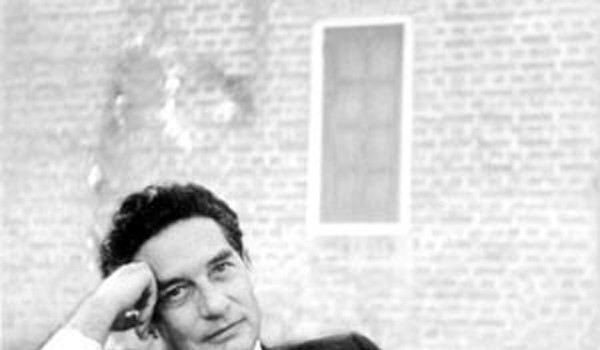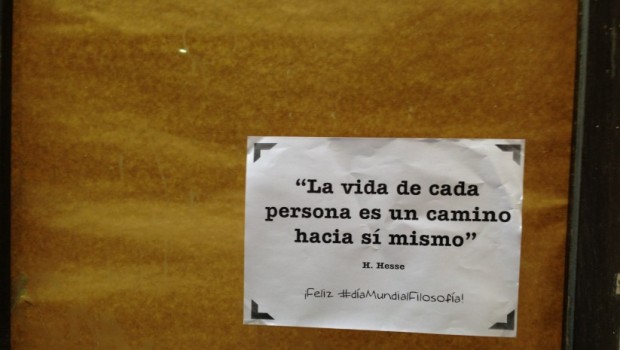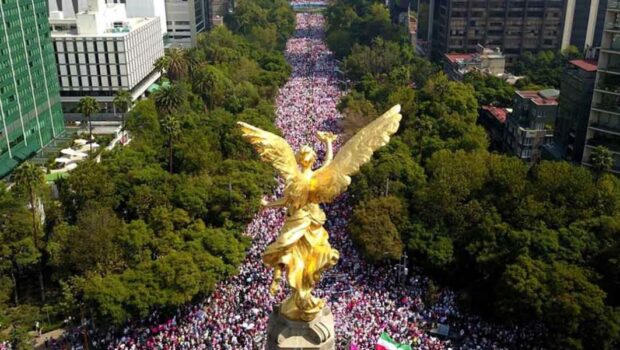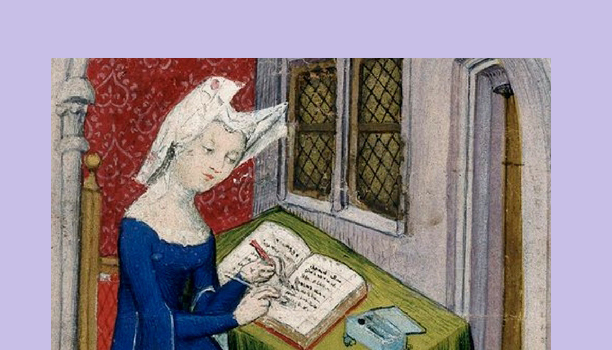The Twilight of the Intellectual Poet
El ocaso de los poetas intelectuales
Malva Flores
Apparently, what happened to us was the same thing that
happens to those kids who really shine during adolescence,
in high school. They’re so active and brilliant at that age and
in that condition, they exhaust all their possibilities and never
amount to anything. It’s a generation of perpetual adolescents,
perpetual students, in a disenchanted juvenile limbo.
HUGO HIRIART
In mid-June, 1999, a singular match took place at the “Lightning Center” indoor soccer sports facility located in southern Mexico City: the staff of a fledgling cultural magazine—with their director, Enrique Krauze, looking on from the stands— challenged the staff of another magazine, Nexos, to a friendly soccer game. Left behind were the skirmishes produced by a battle between Nexos and Vuelta over the sticky affair of “The Experience of Freedom” Encounter held by Vuelta in 1990 and the subsequent “Winter Colloquium” organized in 1992 by the magazine Nexos, the National Autonomous University of Mexico (UNAM), the National Culture Council (CONACULTA) and independent organizers Carlos Fuentes and Jorge G. Castañeda.
Perhaps the anecdotes that would have made it impossible to play such a game a few years earlier were covered by the dust the players had raised, and the statements drafted by Krauze regarding Carlos Fuentes, one of Nexos’ most beloved authors, during his presentation of History Tells no longer mattered to anyone: the “game of man” had brought them together.
“Fuentes does not require a retraction, nor I the forgiveness that will never be asked of him (…) differences as profound as these cannot be resolved by an embrace of Acatempan,” Krauze had said at the time. Now, the hundreds of statements and pages that the press, cultural sections, and magazines had dedicated to this well-known confrontation seemed significantly far removed from the playing field. In retrospect, its origin, apparently, was rather distant from literature itself (with the exception of a conflict triggered by a text Krauze wrote, “Carlos Fuentes’ Mexican Comedy”) and whose backdrop—the relationship between intellectuals and the State—can be traced back in general terms to the discussion of President Echeverría’s “democratic openness,” Corpus Thursday** and Fuentes’ call for a “vote of confidence” supporting Echeverría. Gabriel Zaid responded to the latter by proposing that Echeverría be summoned after a certain deadline and made publicly accountable regarding the results or advances of investigations into these violent events.
Following a coup at the newspaper Excélsior in 1976, the confrontation proceeded through various polemics until 1992, when it reached subzero temperatures as a result of the controversy raised by the organization of a “Winter Colloquium,” the publication of free textbooks and the appointment of José María Pérez Gay as director of nascent cultural television channel 22. That same year, it was topped off by a brief literary squabble, the final “debate” in a fin de siècle that never quite managed to take on the proportions of other major Mexican literary polemics from the first half of the 20th century, featuring such outstanding examples as the one led by the group known as the Contemporaries, who opposed the notion of nationalist culture by establishing dialogues with other modern, Western cultures. However, as Guillermo Sheridan rightly observed:
[…] we cannot ignore the fact that certain topical variants of an ideological bent in the debate regarding nationalism that followed the Revolutions were visible among literary projects identifiable with the “social realist” project during the decade of the 1930’s […] and in recent discussions regarding “light” literature, or the renovated impetus of other literary sentimentalisms: neoindigenism, neocostumbrism, neohistoricism, generic (feminist and/or gay) literature.
“Light” versus “heavy” literature would become opposite poles in this new battle, a literary postscript to scuffles surrounding what Paz would call “A Confederacy of Literatti,” his label for a “Winter Colloquium” wherein the poet saw, beyond any ideological divergences, the playing pieces of a strategy whose goal appeared to be crystal clear: “beyond the immediate political significance of the Colloquium, I highlight what seems essential to me as a writer: this meeting was yet another episode in a campaign to take over the vital centers of Mexican culture. That is the true significance of the current polemic.”
In the midst of all the hubbub this bitter discussion caused within the literary republic, the magazine Macrópolis published a series of op-ed articles (by Rafael Pérez Gay, Jaime Aljure, Guadalupe Loaeza, and Margo Su, among others) under the column “In Favor of Easy Literature” in its third issue, dated March 26, 1992. The magazine Vuelta responded, indirectly at first, in issue 186 under the headline “The Legacy of the Contemporaries,” then openly in issue 188 in July that same year under “In Defense of Difficult Literature.” In his editorial, Aurelio Asiain affirmed:
In our country, a group of journalists dubbed as writers—who dedicate themselves, with good fortune, to the task of editing—has declared itself for years now in favor of a “democratic literature” that, plebiscitarianly defined, finds legitimacy in its political nature first and foremost, over any literary virtues. With the praiseworthy objective of supporting the development of a national literary market through the introduction of trinkets, these “democratic” works defend lightness as their greatest virtue and propagate a taste for the anecdotal. No wonder this marriage between market and ideology has received the blessing of our educators, whose pragmatic vision does not perceive literature to be anything but a didactic instrument, a historically useful document, a tool for the formation of national sentiment and an element of social cohesion among the masses. Between “light” literature and textbooks, there is but one step.
It comes as no surprise that it was a young poet who denounced the “marriage between market and ideology,” the same man who, upon Paz’s death, invited over 25 poets to the editorial and advisory boards of a new magazine—Paréntesis or Parenthesis—which, during only 17 issues of existence, relegated any political discussion to focus exclusively on the publication of literature. His catch-phrase formed part of a refutation—on the literary playing field this time—to the position taken by the board of editors at the magazine Nexos, which in the May 173 issue that same year had published its response to the “confederacy of literatti.” There, among many other arguments, they warned about the “success among the public and media” enjoyed by the Colloquium, a success that “those who pride themselves so much on writing only for readers, for society and under no circumstances for the Prince, must humbly accept.” According to the editors, the success they had garnered was irrefutable proof of the “country’s cultural vigor,” but also of “a growing cultural market.”
Of the eight authors published by Vuelta in defense of “difficult literature,” seven were poets (Octavio Paz, Joseph Brodsky, H. M. Enszensberger, Adonis, Shuichi Kato, Lars Forssell, Kjell Espmark and Michel Butor). In “The Advantages of a Minority Condition,” Hans Magnus Enzensberger recalled how Flaubert or Baudelaire strived “not to cater to the popular taste and [to] protect their work against the intrusion of commercial values,” values disdained by poetry which “is the only human product that has resisted all attempts at commercialization.”
Thus, beneath a polemic that at first glance was centered on the relationship between intellectuals and the State and had animated the discussion between these participants for over 25 years, there was perhaps another, not so evident phenomenon, that might lead us to couch their arguments in other terms. Behind the stance of the intellectual confronting authority, we find once again that age-old dispute regarding the autonomy of art and the artist’s relationship with “bourgeois” power, a Baudelairean equation analyzed—among other contemporary thinkers—by Pierre Bourdieu.
To define this dispute in the case of Mexico as a squabble between poets, narrators and “specialists”—a classification based on its most highly visible figures— would be missing the point. However, it isn’t entirely arbitrary to note the obvious connections and ask oneself what the poets’ position was, or how the historic and social circumstances contributed to this twilight, this decay, of the figure of the intellectual poet for whom, from the time of Independence, political participation and the discussion of national affairs were not at odds with the task of writing poetry.
To speak of a twilight of intellectual poets precisely during the second half of the 20th century would be paradoxical, considering that one of its major protagonists was Octavio Paz, considered by José Luis Martínez to be the last “cultural boss” of that period. To observe that 20th-century Mexican literature ended on “April 19, 1998, the day when [Paz] died,” is intended as a tribute, but moreover a compendium that encompasses an understanding not only of the literary act itself, but also of the historical moment in which it takes place and that, for the purposes of this essay, began during the 1970s.
As a result of the events of 1968 and 1971, the breakthrough in the intellectual field of academic “specialists” (whom Gabriel Zaid called “the universitarians,”) and the rise of narrators, I believe that the twilight of intellectual poets is due, among these and other circumstances, to the definitive closure of an essentially Romantic current that viewed poets as sustainers of moral truths, thanks to which they would become the “critical conscience” of their time. I am not, of course, referring to the conscience that intervenes in the construction of an official national identity. On the contrary, I speak of the intellectual who, thanks to public exposure of his or her thought, is raised up as an alternate and independent power; whose strength consists of the value of his or her ideas and the repercussions they may have on society as a whole, as represented by its intellectual and political elite. By this I mean the modern intellectual, so widely documented in bibliographies that any further explanation is unnecessary. That is to say, he who no longer participates as “counselor to the Prince” or ideologue of a regime, but rather lives the task of opposing public power—in any of its manifestations—through the free and, moreover, public exercise of ideas and writing.
In many ways, Paz would represent among us the last poet in this Romantic line, in such a way that the discussion of his intellectual affairs proves to be indispensable for an understanding of the cultural panorama of our country during the past century. However, despite his vast presence, the concept of the intellectual poet cannot be understood solely through an analysis and discussion of his work. A prominent position that perhaps Paz claimed, according to Héctor Aguilar Camín, as “his” place in the world, “which I think would all be very well and good, if not for the fact that it’s an enormous place and you simply can’t avoid running into him.”
Thus, when the young staff members of Letras Libres faced Nexos contributors in a friendly game, it seemed to symbolically conclude twenty-five years of confrontation. It was not, however, an act tantamount to the one that launched the newspaper El Renacimiento in 1869, when Mexican writers, forgetting their political differences and enveloped in the spirit of nationalism, came together in order to create an organ of literary expression. Yet the fact was that, 130 years later, another chapter of Mexican literary and cultural life seemed to come to a close on the soccer field.
“We have inherited an intellectual tradition,” Enrique Krauze claimed while launching the electronic version of the first issue of Letras Libres, “that for over two decades was incarnated through Octavio Paz’s Vuelta magazine. We believe in literary quality and intellectual clarity, in political freedom and democracy. […] But Letras Libres is not a return to Vuelta. Not only because that magazine was indistinguishable from the life and work of Octavio Paz, but because circumstances of every kind are quite different now.” Curiously enough, in its printed version, a nuance was made with regards to Paz’s “heritage.” As Krauze said in his presentation, “(a)lthough we will continue to publish eminent authors who concurred with his pages [those of Plural and Vuelta], in Letras Libres—a name coined by Paz himself—we do not feel we automatically inherit his legacy: we shall do whatever we can to earn it.” By the seventh issue (July 1999), this heritage had been conquered, given that Letras Libres appeared in a “periodical tree of Mexican literature,” prepared by the magazine’s board of editors and signed by Christopher Domínguez, as the indisputable direct heir not only of Vuelta but, parting from the Contemporaries, the tall and robust trunk of national periodical publications it crowned within the field of literature.
In effect, the times and circumstances had changed, yet the editors felt it necessary to publish a letter from the poet dated 1990 and addressed to Enrique Krauze, that somehow justified the appearance of this new magazine and gave “strong backing” to the man who would become its assistant director for six years, Fernando García Ramírez, former member of Vuelta and Krauze’s employee in the publishing house Clío, who had stopped writing in Paz’s magazine since 1993 (i.e., two years after the aforementioned letter), and whose final issue—which reunited former articles by those who might be considered “in house” authors—does not feature his own name. In said letter the poet warned that, in effect, there was a need to transform or create a new publication in order to avoid “the sad destiny of the Nouvelle Revue Française or that of Revista de Occidente.”
I add, Paz concluded, that it isn’t enough to have new ideas and purpose; a new director and group are also needed. Of course, the new publication (the new Vuelta, in its second stage) will have to be a cultural magazine. The members of its Board of Copy Editors (no more than five) should be chosen from among those who today form part of our group. I’m thinking, above all, of Adolfo Castañón, Aurelio Asiain and Fernando García Ramírez.
None of these three characters, all of whom are poets, attended the soccer match held on the “Lightning Center” field. Of the participants in the new project, there was only one poet: Julio Trujillo, future Secretary of Copy Editors at Letras Libres, who was asked by virtue of his participation in a Poetry Festival organized in 2003 by the Pablo Neruda Foundation about the poet’s role and labor: “In this personal labor,” he indicated, “a social temperature, a political pulse, may or may not be reflected… [but] that’s no longer necessary. It’s not something people pursue, it’s no longer a qualification.”
Thirty years earlier, with the events of Tlatelolco and Corpus Thursday fresh in our memories, the polemic described here was beginning in a section of Plural entitled “Mexico 1972: Writers and Power.” In his introduction, Octavio Paz wrote:
Politics were what filled Malraux’s brain with smoke, poisoned Cesar Vallejo’s insomnia, killed García Lorca, left old Machado abandoned in a town in the Pyrenees, locked Pound up in an insane asylum, dishonored both Neruda and Aragon, have made Sartre look ridiculous, and have proven Breton right, albeit too late… But we cannot shirk politics; that would be worse than spitting into the wind: it would be spitting on ourselves.
Three decades span Paz’s phrase and Julio Trujillo’s statement. During that same period, some of the poets whose work forms part of our tradition emerged: José Luis Rivas, Francisco Hernández, David Huerta, Elsa Cross, Antonio Deltoro, Coral Bracho, Fabio Morábito, etc.
While it is very likely that Julio Trujillo’s statement was made in reference to that variant of social poetry that devolved into pamphlets or militancy, I find it notable that on the same day Trujillo responded regarding the labor of poets, another poet, David Huerta, commented on the disinterest of current poets in anything other than “what’s theirs”, contrasting them with “true Romantics [who] were no longer confined to lyric expression but occupied themselves with historic, mythological, and religious affairs […] they were interested in everything and everyone […] Now we must conform ourselves with nothing more than what happens to the poet in his lifetime and the news he provides of this in his verse. Very little, indeed.” What happened during this period to make poets who currently possess a mature work willing to settle for only offering us data from their lives? Why, in their majority, and despite having Paz as a tutelary figure, did they abandon the intellectual role that was previously common currency in our republic of letters?
The generation of poets who experienced the events of 1968 and their replica in 1971, who believed in the ideals of rebellious youth, who mimeographed their first books, and who witnessed the decline of the oil boom underwent a whirlwind of historic and social change not wanting to redefine themselves (or not knowing how). Or perhaps neither of these two alternatives is true, but in today’s world the public no longer takes an interest in the reflections of a critical conscience backed by the “moral value” of poetry. Taking refuge in this as an activity on the margins of current events, the poets of this generation saw, on one hand, how the importance of “literary life”—at one time the axis of artistic and critical life in this country—gave way to the growing importance of public opinion, with its own professionals or opinion leaders. On the other, they witnessed the breakthrough and consolidation of specialists and academics who occupied, in the discussion of any issues outside strictly literary ones, the place once held by, among others, poets in their role as public intellectuals. Why should they have to be consulted on economic, political, or any other affairs if there were already specialists with degrees whose specialized opinion turned out to be more pertinent, more “serious” than that of poets? As Christopher Domínguez already pointed out not long ago, from a different angle: “the multiplication of Opinion returns aesthetic dominion to the literary (or art) critic.”
 Malva Flores es poeta y ensayista. Su libro más reciente es La culpa es por cantar. Apuntes sobre poesía y poetas de hoy (Literal Publishing/ Conaculta, 2014). Es columnista de Literal. Síguela en Twitter: @malvafg.
Malva Flores es poeta y ensayista. Su libro más reciente es La culpa es por cantar. Apuntes sobre poesía y poetas de hoy (Literal Publishing/ Conaculta, 2014). Es columnista de Literal. Síguela en Twitter: @malvafg.
©Literal Publishing
A nosotros, al parecer, nos sucedió lo que a esos muchachos
que son muy brillantes en la prepa, en la adolescencia,
tan activos y brillantes que agotan en esa edad y condición
todas sus posibilidades y luego no llegan a nada: es una
generación de adolescentes perpetuos, de estudiantes perpetuos,
de limbo juvenil desencantado.
HUGO HIRIART
A mediados de junio de 1999, en las instalaciones deportivas del “Centro Rayo” para futbol rápido, ubicadas al sur de la ciudad de México, se llevó a cabo un singular encuentro: los integrantes de una joven revista cultural, observados desde las gradas por su director, Enrique Krauze, se enfrentaban a los integrantes de otra revista, Nexos, en amistoso partido de futbol. Atrás habían quedado las rencillas producto de la pelea entre Nexos y Vuelta sobre el engorroso asunto del Encuentro “La experiencia de la libertad”, realizado por Vuelta en 1990 y el posterior “Coloquio de Invierno”, organizado en 1992 por la revista Nexos, la UNAM, el CONACULTA y como organizadores independientes, Carlos Fuentes y Jorge G. Castañeda. Quizá en el polvo que los jugadores levantaban permanecían las historias que unos años antes habrían hecho imposible la realización del partido, y las declaraciones que durante la presentación de La historia cuenta había formulado Krauze sobre Carlos Fuentes, uno de los autores queridos de Nexos, no importaban a nadie: “el juego del hombre” los reunía. “No requiere Fuentes una retractación, ni yo un perdón que nunca le pediré […] una diferencia tan profunda como esa no se resuelve con un abrazo de Acatempan” había dicho Krau- ze en aquella presentación. Ahora, lejos de la cancha parecían haber quedado los cientos de declaraciones y páginas que la prensa, los suplementos y las revistas culturales habían dedicado a la tan conocida confrontación, cuyo origen se encontraba, aparentemente, más bien lejos de las letras (con excepción del affair producido por el texto del propio Krauze, “La comedia mexicana de Carlos Fuentes”) y cuyo fondo —la relación entre el Estado y los intelectuales—, puede rastrearse en líneas generales tomando como punto de partida la discusión sobre la “apertura democrática” de Echeverría, el Jueves de Corpus y el “voto de confianza” a favor del presidente solicitado por Fuentes, sugerencia a la que respondió Zaid proponiendo emplazar a Echeverría para que, después de cierta fecha límite, rindiera cuentas públicamente sobre los resultados o avances de las investigaciones acerca de aquellos violentos sucesos.
Después del golpe a Excelsior en 1976, esta confrontación continuó en diversas polémicas hasta alcanzar su punto más álgido en 1992, a raíz de la controversia suscitada por la realización del “Coloquio de Invierno”, la publicación de los libros de texto gratuitos y la designación de José María Pérez Gay como director del naciente canal 22 de televisión. Ese mismo año esta confrontación tuvo como remate una breve disputa literaria, último “debate” en el fin de siglo que nunca adquirió las proporciones de otras importantes polémicas literarias acaecidas en la primera mitad del siglo XX mexicano, entre las que destaca, sin duda, aquella protagonizada por el grupo de Contemporáneos quien oponía a la idea de una cultura nacionalista la de un diálogo con las otras culturas occidentales modernas. Sin embargo, y como bien observó Sheridan:
[…] no puede ignorarse que algunas variantes tópicas de naturaleza ideológica del debate sobre nacionalismo posterior a la Revolución serán visibles en los proyectos literarios identificables con el proyecto “realista socialista” de la década de los treintas […] en las recientes discusiones sobre literatura light, o el renovado aliento de otros sentimentalismos literarios: neoindigenismo, neocostumbrismo, neohistoricismo, literatura genérica (feminista y/o gay).
Literatura “light” versus literatura “difícil” serían los polos de esta nueva contienda, posdata literaria de las trifulcas en torno a lo que Paz llamaría “La conjura de los letrados”, bautizo para el “Coloquio de Invierno” donde el poeta vio, más allá de las divergencias ideológicas, las piezas de una estrategia cuyo fin parecía prístino: “más allá de la significación política inmediata del Coloquio, subrayo algo que a mí, como escritor, me parece esencial: esa reunión fue un episodio de una campaña para apoderarse de los centros vitales de la cultura mexicana. Esta es la verdadera significación de la polémica actual”.
En medio del alboroto que esta agria discusión había causado en la república de las letras, la revista Macrópolis, en su número 3 del 26 de marzo de 1992, publicó una serie de opiniones (de Rafael Pérez Gay, Jaime Aljure, Guadalupe Loaeza, Margo Su, entre otros) agrupadas bajo el nombre de “Por una literatura fácil”, opiniones a las que, primero en forma indirecta, la revista Vuelta respondió en el número 186 titulado: “La herencia de los Contemporáneos” y ya abiertamente en su número 188, de julio de ese mismo año, bajo el título de “En defensa de una literatura difícil”. En su editorial, Aurelio Asiain afirmaba:
En nuestro país, un grupo de periodistas doblados de escritores —y metidos, con buena fortuna, a editores— se pronuncia desde hace años por una “literatura democrática” que, definida plebiscitariamente, encuentra su legitimidad en su naturaleza política antes que en sus virtudes literarias. Con el loable propósito de fomentar el desarrollo del mercado literario nacional mediante la introducción de baratijas, las obras “democráticas” defienden como su mayor virtud su ligereza y propagan el gusto por lo anecdótico. No es extraño que estas bodas de la ideología y el mercado reciban el padrinazgo de nuestros educadores, cuya visión instrumental no percibe en la literatura sino un instrumento didáctico, un documento útil para la historia, una herramienta para la formación del sentimiento nacional y un elemento de cohesión social de las mayorías. De la literatura light al libro de texto hay sólo un paso.
No era extraño que las “bodas de la ideología y el mercado” fueran denunciadas por un joven poeta, el mismo que, a la muerte de Paz, reunió a más de 25 poetas en los consejos editorial y consultivo de una nueva revista —Paréntesis— que, en sus escasos 17 números de existencia, relegó la discusión política y se concentró exclusivamente en la publicación de literatura. Aquella frase era parte de la refutación —esta vez en el campo de la literatura— a lo expresado por el consejo editorial de la revista Nexos, que en su número 173 del mes de mayo de ese año había dado respuesta a “la conjura de los letrados”. Allí, entre otros muchos argumentos, se advertía sobre el “éxito de público y prensa” que había tenido el Coloquio, éxito que “quienes se glorian tanto de escribir sólo para los lectores, para la sociedad, y en ningún caso para el Príncipe, deberían aceptar con humildad”. El éxito obtenido era, para los editores, la prueba irrefutable del “vigor cultural del país”, pero también, “de un mercado cultural en crecimiento”.
De los ocho autores que Vuelta publicó en defensa de la “literatura difícil”, siete eran poetas (Octavio Paz, Joseph Brodsky, H. M. Enzensberger, Adonis, Shuichi Kato, Lars Forssell, Kjell Espmark y Michel Butor). En “Las ventajas de la condición minoritaria”, Hans Magnus Enzensberger recordaba cómo Flaubert o Baudelaire se habían empeñado en “no complacer al gusto popular y [en] proteger a su obra contra la intrusión de los valores comerciales”, valores desdeñados por la poesía que “es el único producto humano que ha resistido todos los intentos de la comercialización”.
Así pues, por debajo de la polémica que a primera vista encontraba su centro en la relación entre los intelectuales y el Estado, y que durante más de 25 años animó la discusión de estos participantes, existía tal vez otro fenómeno no tan evidente, que podría llevarnos a plantear la discusión en otros tér- minos. Bajo la postura del intelectual frente al poder volvemos a encontrar también aquella añeja disputa sobre la autonomía del arte y la relación del artista frente el poder “burgués”, ecuación baudelaireana analizada —entre otros pensadores contemporáneos— por Pierre Bourdieu.
Definir esta disputa, en el caso mexicano, como una pugna entre poetas, prosistas y “especialistas” —esquematizando con base en sus figuras más visibles—, reduciría el sentido de la discusión, sin embargo, no es del todo arbitrario advertir sus lazos evidentes y preguntarse cuál fue la actitud de los poetas y cómo las circunstancias históricas y sociales contribuyeron al ocaso, al decaimiento de la figura del poeta intelectual, aquel que desde el periodo de Independencia había hecho de la participación política y de la discusión de los problemas nacionales una actividad que no estaba reñida con su quehacer poético.
Resultaría paradójico hablar del ocaso de los poetas intelectuales y situarlo justamente en la segunda mitad del siglo XX, considerando que uno de sus mayores protagonistas fue Octavio Paz, a quien José Luis Martínez considera el último “cacique cultural” del siglo pasado. Advertir que el final de las letras mexicanas del siglo XX concluyó el “19 de abril de 1998, día de la muerte” de Paz, quiere ser un homenaje pero es asimismo un compendio que incluye no sólo la comprensión del hecho literario mismo, sino también del momento histórico en que ocurre y que, para efectos de este trabajo, inicia en la década de los sesenta.
Amén de los sucesos del 68 y el 71, de la irrupción en el ámbito intelectual de los académicos “especialistas” (a los que Gabriel Zaid denomina “los universitarios”), así como del encumbramiento de los narradores, creo que el crepúsculo de los poetas intelectuales se debe, entre éstas y otras circunstancias, a la clausura definitiva de una vertiente esencialmente romántica que veía al poeta como el mantenedor de una verdad moral gracias a la cual se convertía en la “conciencia crítica” de su tiempo. No me refiero desde luego a la conciencia que interviene en la construcción de una identidad nacional oficial sino, contrariamente, hablo del intelectual que gracias a la exposición pública de su pensamiento se erige en un poder alterno e independiente cuya fuerza radica en el valor de sus ideas y la repercusión que éstas puedan tener en el conjunto de la sociedad representada por sus élites intelectuales y políticas. Se trata del intelectual moderno, tan ampliamente documentado por las bibliografías que no hace falta abundar en ello, aquél que ya no participa como “consejero del príncipe” o como ideólogo de un régimen, sino que vive la tarea de oponer al poder público —en cualquiera de sus manifestaciones— el ejercicio libre y también público de sus ideas y escritos.
En muchos sentidos, Paz representaría entre nosotros al último poeta de esta estirpe romántica, de modo que la discusión de su quehacer intelectual resulta imprescindible para entender el panorama cultural de nuestro país en el siglo pasado; sin embargo, y pese a su enorme presencia, la idea del poeta intelectual no puede ser entendida mediante el análisis y la discusión únicos de su obra. Un lugar prominente que Paz reclamaba quizá, según recuerda Héctor Aguilar Camín, como “su” lugar en el mundo, “lo cual me parece muy bien, salvo porque es un lugar enorme y no hay modo de no toparse con él”.
Así, cuando aquellos jóvenes integrantes de Letras Libres se enfrentaron en partido amistoso a colaboradores de Nexos, parecían cerrar simbólicamente 25 años de enfrentamientos. No era, sin duda, un acto similar al que dio origen, en 1869, al periódico El Renacimiento, cuando los escritores mexicanos, olvidando sus divisiones políticas, se reunieron arropados por un espíritu nacionalista para crear un órgano de expresión literario. Lo cierto es que, 130 años después, otro capítulo de la vida literaria y cultural mexicana parecía cerrarse en una cancha de futbol.
“Somos herederos de una tradición intelectual —decía Enrique Krauze, en la presentación de la versión electrónica del primer número de Letras Libres— que por más de dos decenios encarnó en la revista Vuelta de Octavio Paz. Creemos en la calidad literaria y la claridad intelectual, en la libertad política y la democracia. […] Pero Letras Libres no será una vuelta a Vuelta, y no sólo porque aquella revista es indistinguible de la vida y obra de Octavio Paz, sino porque las circunstancias de toda índole son muy distintas”. Curiosamente, en su versión impresa, existía un matiz en relación con “la herencia” de Paz. Decía Krauze en su presentación: “Aunque publicaremos a los destacados autores que concurrieron en sus páginas [las de Plural y Vuelta], en Letras Libres —nombre acuñado por el propio Paz— no nos sentimos herederos automáticos de su legado: haremos lo posible por conquistarlo”. Ya para el número 7 (julio de 1999), esta herencia había sido conquistada, pues Letras Libres aparecía en un “Árbol hemerográfico de la literatura mexicana”, preparado por el consejo editorial de la revista y firmado por Christopher Domínguez, como el indiscutible heredero directo no sólo de Vuelta sino, partiendo de Contemporáneos, del alto y robusto tronco de las publicaciones periódicas nacionales en el campo de las letras, al que coronaba.
Efectivamente, los tiempos y las circunstancias eran distintos, sin embargo, los editores consideraron necesario publicar una carta del poeta dirigida a Enrique Krauze en 1990, que de alguna manera justificaba la aparición de esta nueva revista y daba un “espaldarazo” a quien asumiría durante seis años la subdirección de la misma, Fernando García Ramírez, antiguo miembro de Vuelta y empleado de Krauze en la editorial Clío, quien desde 1993 (es decir, dos años después de la citada carta) había dejado de escribir en la revista de Paz, cuyo último número —donde se recogieron antiguas colaboraciones de quienes podrían considerarse los autores “de la casa”— no consignó su nombre. En dicha carta el poeta advertía, efectivamente, la necesidad de transformar o crear una nueva publicación para evitar “la triste suerte de la Nouvelle Revue Française o de la Revista de Occidente.”
Añado —terminaba Paz— que no basta con tener ideas y propósitos nuevos; hace falta también un director y un nuevo grupo. Por supuesto, la nueva publicación (la nueva Vuelta, en su segunda época) tendrá que ser una revista de cultura. Los miembros de su Consejo de Redacción (no más de cinco) deberían escogerse dentro de los que hoy son parte de nuestro grupo. Pienso, sobre todo, en Adolfo Castañón, en Aurelio Asiain y en Fernando García Ramírez.
Ninguno de estos tres personajes, dos de ellos poetas, asistieron al partido de futbol que se realizó en la cancha del “Centro Rayo”. De los participantes en el nuevo proyecto, sólo hubo un poeta: Julio Trujillo, futuro secretario de redacción de Letras Libres, que con motivo de su participación en un Festival de poesía organizado en 2003 por la Fundación Pablo Neruda fue cuestionado sobre el papel y el trabajo del poeta: “En ese trabajo personal —señaló— podrá reflejarse una temperatura social, un pulso político, o no… [pero] ya no es algo necesario. No es algo que busque la gente, ya no es una calificación”.
Treinta años atrás, recientes en la memoria los hechos de Tlatelolco y del Jueves de Corpus”, en el suplemento de Plural, “México 1972: Los escritores y el poder”, la polémica a la que hemos aludido daba inicio. En la presentación, Octavio Paz decía:
La política llenó de humo el cerebro de Malraux, envenenó los insomnios de César Vallejo, mató a García Lorca, abandonó al viejo Machado en un pueblo de los Pirineos, encerró a Pound en un manicomio, deshonró a Neruda y Aragon, ha puesto en ridículo a Sartre, le ha dado demasiado tarde la razón a Breton… Pero no podemos renegar de la política; sería peor que escupir contra el cielo: escupir contra nosotros mismos.
De la sentencia de Paz a la declaración de Julio Trujillo hay tres décadas de distancia, periodo en el que surgieron algunos de los poetas cuya obra es parte ya de nuestra tradición: José Luis Rivas, Francisco Hernández, David Huerta, Elsa Cross, Antonio Deltoro, Coral Bracho, Fabio Morábito, etc.
Si bien es muy probable que la declaración de Julio Trujillo hiciera referencia a ese tipo de poesía social que devino panfleto o militancia, llama mi atención que en la misma fecha en la que Trujillo respondía sobre los trabajos del poeta, uno de aquellos, David Huerta, reflexionaba sobre el desinterés de los poetas actuales en cualquier otra cosa que no fuera “lo suyo” y los comparaba con “los románticos de verdad [que] no se confinaban a la expresión lírica y se ocupaban de asuntos históricos, mitológicos, religiosos […] Estaban interesados en todo y en todos. […] Ahora debemos conformarnos nada más con lo que le pasa al poeta en su vida y con la noticia que de ello nos da en sus versos. Muy poca cosa, en realidad”. ¿Qué ocurrió en ese periodo para que los poetas que actualmente cuentan con una obra de madurez se conformaran con ofrecernos, exclusivamente, los datos de su vida? ¿Por qué, en su mayoría, abandonaron el papel intelectual que antes de ellos, e incluso teniendo a Paz como figura tutelar, era moneda corriente en nuestra república de las letras?
La generación de poetas que vivió los sucesos de 1968 y su réplica en 1971, que creyó en los ideales de la juventud rebelde, que elaboró en mimeógrafo sus primeros libros, que asistió al derrumbe de la euforia petrolera, se enfrentó a un cambio histórico y social en cuyo vértigo no supo, o no quiso, redefinirse. Tal vez ninguna de estas dos posibilidades sea cierta y en el mundo actual no había ya un público interesado en las reflexiones de una conciencia crítica sustentada sobre el “valor moral” de la poesía. Refugiados en ésta como una actividad al margen de los acontecimientos, los poetas de esta generación vieron, por una parte, cómo la importancia de “la vida literaria”, que antes era el eje de la vida artística y crítica del país, cedía su lugar a la creciente importancia de una opinión pública con sus profesionales (los líderes de opinión) y, por la otra, asistieron a la irrupción y consolidación de los especialistas y académicos que ocuparon, en la discusión de toda clase de problemas ajenos a los estrictamente literarios, el lugar que antes tenían, entre otros, los poetas en su papel de intelectuales públicos. Para qué habrían de ser consultados sobre asuntos de economía, política o sobre cualquier otro aspecto, si ya existían especialistas graduados cuya opinión especializada resultaba más pertinente, más “seria” que la de los poetas. Desde otros ámbitos, ya Christopher Domínguez lo había señalado no hace muchos años: “la multiplicación de la Opinión devuelve al crítico literario (o artístico) al dominio de la estética”.










